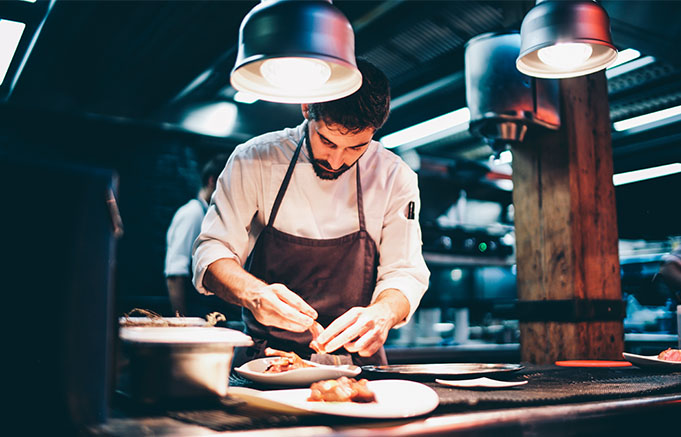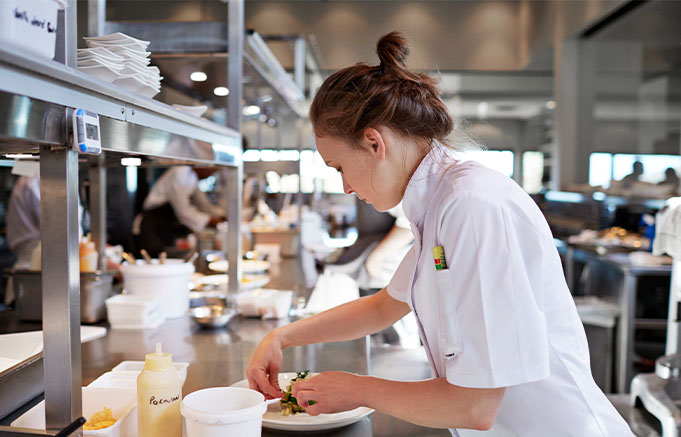How to start a restaurant with maximum success

Starting a restaurant is a dream for many people. Whether you're just leaving school or have worked in the culinary field for a while, there are plenty of options and opportunities to develop a successful restaurant business. It might seem like a somewhat daunting task if you haven't run a business before, but there are ways that you can prepare yourself for your future as a restaurant owner.
In this article, we'll go over the main things that you need to consider when you are thinking of starting a restaurant, including planning, finances, staffing, and more. We'll also discuss the skills and experience it would be helpful to have before starting a restaurant, and why studying at a culinary school in France can help prepare you.
What is a restaurant?
A restaurant can include any type of venue that prepares and serves food and drinks to customers. This encompasses a wide range of establishments. The concept of restaurants has been around for centuries, and the restaurant business is still booming.
Types of restaurant
The exact definition of a restaurant depends on who you ask. To some people, the term only includes places where you sit and enjoy your meal on the premises. Others would include fast food outlets and other more casual options in the restaurant category. Of course, there's a huge variety of options when you want to start a food business; and you might even want to start a catering business. When considering ideas, you could look at starting a wide range of restaurant types, including the following.
- Full-service restaurants: These are restaurants where customers sit down and a waiter takes their orders and brings their food.
- Casual restaurants: These would usually have a more relaxed atmosphere, and your diners may or may not receive table service.
- Fast food or fast casual restaurants: In these restaurants, people order at the counter and pick up their food before selecting a table to sit at.
- Fine dining: This type of establishment is all about luxury and quality of food accompanied by a carefully crafted ambiance and decor.
- Food stalls: In busy city areas, you might be able to open a food stall where the food is cooked in front of customers. There may or may not be seating. Some food stalls are permanent while some are more temporary, and can be moved to cater for events.
- Food trucks: There are food trucks serving almost every cuisine. These have the advantage of mobility and can go where customers congregate at different points in the day.

Steps to follow to start a restaurant
If you need to know how to start a restaurant business, these are all important aspects to consider. Many cover subjects you will learn through a culinary arts career or while studying for a degree in the culinary arts.
World-leading degrees in culinary entrepreneurship
Combining academic study in business and management with culinary training and professional internships, our degrees give you the essential skills for starting a restaurant.
Designing your restaurant
The first step in starting a restaurant is to decide what type of restaurant you want and the market you will serve. Here are some of the important factors that can help you identify your concept.
- Focus on a cuisine or theme: Many restaurants stick to one type of cuisine, while others focus on fusion food or a wider range of dishes. You'll need to make this selection early so you can start menu development, but it's never too late to change and go in a slightly different direction.
- Choose a food service type: Pick your restaurant type. You should decide whether you want to have full-service, casual service, fast food-style dining, or even a food truck.
- Identify your niche: Each restaurant needs a unique selling point that makes it stand out in the market.
- Name your restaurant: Picking a name for your restaurant can be a challenge. Try to think of something meaningful to the type of food or theme or concept you're offering, as well as being memorable.
- Work on your branding: Marketing efforts need to complement your theme and cuisine, as well as the overall feel of the restaurant.
Create a business plan
Starting a restaurant means you need a solid restaurant business plan. There are various elements to consider when making a plan.
- Identify your target market: A restaurant without customers won't survive long, so you need to figure out who your customers are and make sure you're offering something they'll want.
- Analyze the competition: Competition can be high in the restaurant business, and you need to know what kind of competitors you'll be up against.
- Find suppliers: You'll need to build good supplier relations, find reliable supply lines and be aware of costs.
Funding and finance
The cost to open a restaurant can be substantial, so you need to consider your funding and finances carefully.
- Calculate costs and revenue: You must ensure your business will be profitable, so you need to keep a close record of costs and use revenue forecasting to see what services you can offer while making a profit.
- Startup capital: There can be a significant initial cost to open a restaurant. Luckily, you can estimate this by looking at the amounts required for rent, utilities, staffing, marketing, fittings, and ingredients to see how much money you'll need for starting a restaurant.
- Equipment funding: Unless you're taking over premises that already has all the restaurant kit and appliances you need, you'll need to look at buying or leasing industrial cooking equipment.
- Ingredient costs: Your food costs will be a significant part of your day-to-day costs. You should work out which ingredients you can source at better prices or lower costs to help save money and increase profit margins.
- Loans and investors: Many entrepreneurs fund their new restaurants through loans or investors. Getting experience with running a business can help you learn how to approach financing.

Finding the right location
Finding a good location can be a challenge but is often vital to success. Things you need to consider are:
- Find the appropriate neighborhood: You'll need to identify an area where your restaurant concept will be successful. For example, fine dining restaurants are typically located in more affluent or central areas. Your restaurant location is an important thing to get right.
- Evaluate the space: You need to make sure you find a building suite of rooms that has enough space for the number of guests you hope to seat and the necessary kitchen facilities.
- Design your restaurant interior: Planning restaurant decor can be fun, but you must also make sure it works well with your theme and dining style.
Hiring staff
Once you have everything else in place, you will need to consider staffing.
- General staffing needs: You'll need to decide what functions you'll carry out in the restaurant, and hire staff for other roles, including front of house, back of house, chefs, and any support roles such as accountants.
- Recruitment strategies: You can use your industry associations to help you find reliable staff, advertise, or use agencies.
- Training and retaining staff: It's important to train your staff in customer service, culinary arts, and health and safety regulations. You'll also need to offer competitive wages to retain your staff.
Marketing your restaurant
Marketing is crucial to help any restaurant succeed. Some elements to consider in your marketing, including the implementation of restaurant marketing strategies, include the following
- Developing a marketing plan: This should include the types of advertising you will use, as well as any specific marketing around soft and official openings. You also need to tailor your marketing to your target customer type.
- Building an online presence: Online marketing is a must for restaurants these days and it's essential to have an informative, mobile-optimized website and effectively maintain a social media presence, using good social media marketing.

Education and training required for starting a restaurant
If you're striking out on your own and starting a restaurant, there are no required qualifications. However, proper training in the culinary arts can provide a massive boost to your skills and knowledge and give you a fundamental platform for success.
Intensive diploma studies in the culinary arts
During this course, you'll learn vital culinary techniques as well as restaurant management and entrepreneurial skills that will give you everything you need for starting a restaurant.
Benefits of studying at a culinary school
Some of the main advantages of studying at a culinary school include these benefits.
- Learning the fundamentals of cooking: Even if you don't plan to cook, you should have a thorough knowledge of the concepts of cooking and the culinary arts to ensure that your kitchen team is doing the best they can.
- Gaining experience in professional internships: Getting experience from an internship can give you real-world knowledge that is essential for running a restaurant, so you should pick a course with internships if possible.
- Building a network of industry professionals: Knowing other culinary professionals can help you discover more about how to start a restaurant. These contacts might be able to help you with your concept or business plan, as well as help you find good staff.
- Accreditation and reputation: If you choose a recognized culinary school, this could be a significant boost to your reputation and that of your restaurant. Customers like to know that they're in well-qualified hands.
- Curriculum and specializations: Studying at a culinary school will provide you with specific training in the areas of the culinary arts that matter the most to you and your restaurant concept.
Main skills for starting a restaurant
There are many skills that you should focus on developing if you want to run a successful business, such as:
- Managerial skills
- Entrepreneurship
- Financial knowledge
- Multi-tasking
- Critical thinking
- Planning and organizational skills
- Team leadership
- Determination
What are the common challenges and risks associated with starting a restaurant?
Of course, as well as being exciting, starting a restaurant can be demanding and it requires dedication. Some of the main issues that you might come up against when starting this type of business are:
- Low cash flow on quiet days Insufficient marketing
- Food storage
- Menu creation
- Poor brand reputation
- Finding good staff
- Getting the right business license
- High startup costs
- Getting high-quality kitchen equipment
All of these issues can be easier to resolve with the proper training and knowledge in the culinary field.
Top tips for success in starting a restaurant
Our top tips for running a successful restaurant include:
- Come up with a unique idea
- Get culinary training
- Plan thoroughly
- Be adaptable
- Stay focused and work hard

Starting a restaurant: conclusion
Starting your own restaurant can be an amazing way to progress your culinary career or to make a change in your life with your own business. It's no surprise that starting a business in the restaurant industry is a dream for many people, but it doesn't just have to be a fantasy.
You need to properly plan your restaurant concept and look at the funding, assess competition, and put in the work to secure good staffing, develop tempting menus, and create an irresistible atmosphere for diners. You also need to acquire all the equipment and put together a good marketing strategy. A great first step is to study at a respected culinary school. If you're unsure how to get into culinary school, we can help. Start moving towards the restaurant of your dreams with Ecole Ducasse today.
Photo credits
Main image: pixdeluxe/E+ via getty images
2nd image: 10'000 Hours/DigitalVision via getty images
3rd image: Westend61/Royalty-free via getty images
4th image: Royalty-free/DigitalVision via getty images
5th image: Hispanolistic/E+ via getty images


